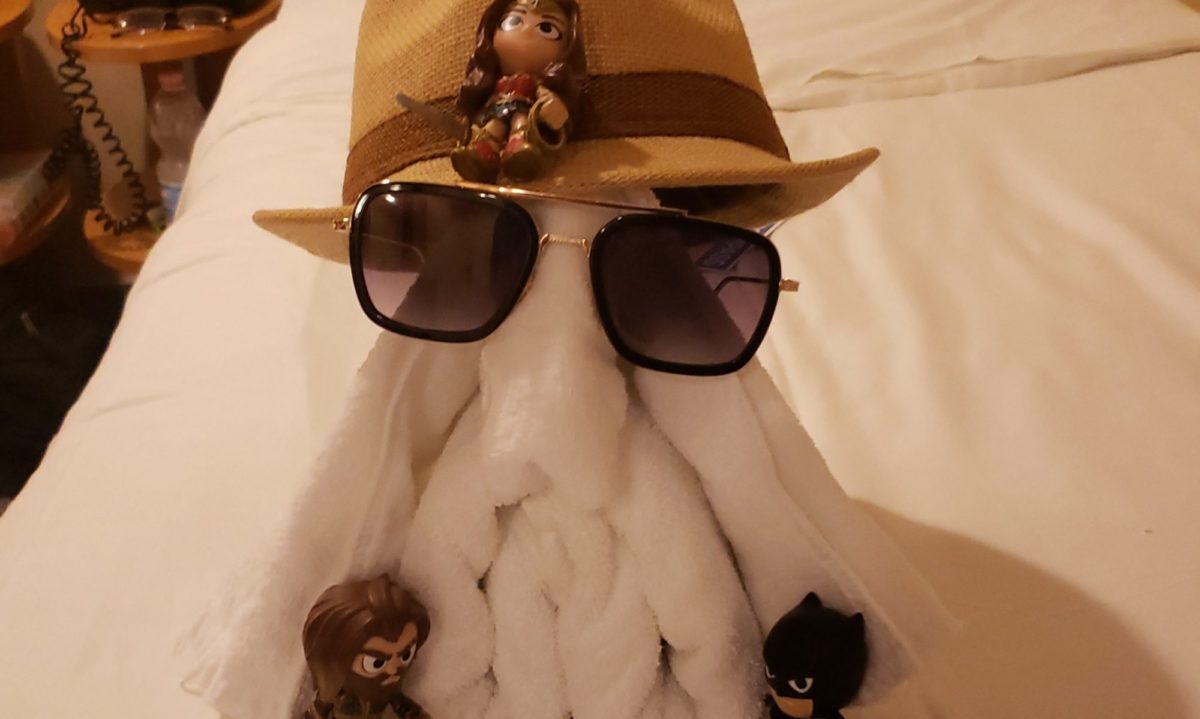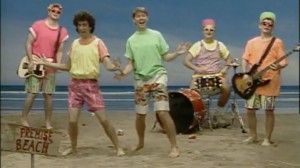Okay. That last post has held the front page long enough. Time to move past sad tales of past failures and resume my look through my old scripts–oh. Right. Well at least these were mistakes I did learn from.
Ladies and gentlemen, Forging the Team.
What’s it about?
Ed, Amy, and Les have been collaborating for years. Their goal? To one day produce their own comic book. Ed writes plots, Amy scripts, and Les draws. Ed also acts as the gang’s agent, and he’s landed a pitch meeting with Impact Comics. They’re going to have their chance to pitch their own super hero team: they just need to decide what that team’s going to be. Ed thinks they should sell a team he came up with: The American Freedom League, greatest heroes of the 1950s.
Les is obsessed with visuals, too tied up in what looks good on the page to have any idea what makes for good characters or stories. By way of a for instance, Les creates The Sketcheristo, a hero whose drawings come alive. His name isn’t the only problem: he’s also an unrepentant Nazi war criminal.
Amy is busy tearing down the few characters of Ed’s that Impact has liked, trying to subvert standard comic stories and inject more feminism. She finds Supreme Avenger too derivative of Superman, thinks the sexual tension between occultist The Blue Witch and scientist The Astounding Professor Night too cliche, and resents that Blue Witch is the team’s only woman and is called “sultry” right off the bat. Ed worries that her less crowd-friendly ideas might put off Impact, but she fights him at every step.
Ed must not only assemble the perfect team of heroes to pitch to the company, he must also find a way to forge the three friends into a true creative team.
See what I did with the title, there?
Whew. No Premise Beach at all this time. Okay. Good start.
So why’d that happen?
Short answer is “It was my final project for playwriting class in University,” but that’s a dull answer.
It’s likely no surprise, given how many opinions I have about Batman, that I’m a comic book geek. I was also running a superhero-based role playing game with my friends. So, needing a subject for a one-act play (final project and all that), I decided to tap into that world. Play around there. And for super hero character concepts, including many of Les’ hilariously bad ideas, I looked no further than my role players. After all, these were the people who, when asked to make characters for a super team in pre-civil rights Cold War America, came up with an African prince, a Nazi war criminal and a Russian communist named Glastnost Guy.
Comic gold, even for people who don’t follow the Justice League.
How’d it turn out?
For starters, I had never seen our teacher laugh as hard as when Les pulled out Sketcheristo. So I’ve got that going for me.
The premise is solid, and many of the jokes work great. The actor who played Ed in the two festivals I entered this in has been bugging me for years to remount it, so clearly the script has its strengths, mostly the comedic beats. And it got me an A, or at least an A-, in the course, so it can’t be all bad.
However.
Amy’s feminism is played as barely more legitimate than Les’ terrible character ideas. Her desire to fill the team with something other than burly white dudes is an obstacle Ed must overcome, even though he does ultimately concede and the fifth character that they add to the team is a second woman. In today’s age of rape threats being lobbed at any feminist critic who dares to claim there is gender inequality in comics or video games; a time when accusations of “fake geek girl” get lobbed at women for trying to express their love of geeky things; a time when Batman has four comics to himself, Superman has three, Wolverine is in more comics than actually exist some weeks, but Wonder Woman can’t get a second book unless she splits it with Superman, Amy’s portrayal is… jarring. Uncomfortable. These controversies weren’t in full bloom when I wrote this 14 years ago, but comic books were still a massive boys’ club, and the fact is that Amy is raising more valid points than anyone else in this script. And yet Ed is our noble protagonist.
It’s a cute story with a few great laughs, but it aged badly in ways I did not anticipate.
Would you stage it again?
The core concept works, and many of the jokes are funny, but I would be hesitant to bring this one back to the stage without some overhauling. First off, I no longer buy Ed as the protagonist. I’m not saying he couldn’t be, but right now, reading the script, I’m not sure I buy it. If he’s the glue that holds the team together, I should be able to see that sooner than the very end.
Second, the play is split into four scenes: one prior to the initial pitch meeting, and three others set in the 20 hours or so between that meeting and the follow-up where Ed needs to present a full team. This means that every time some sort of conflict begins to arrive, Ed calls for a break and we flash forward a few hours. This… does not work. Not really. If I were to take another spin at it, I’d instead say that Ed has landed a pitch meeting with Impact Comics, but it’s in one hour. They have one hour to get this done. Let the looming deadline turn up the pressure from minute one, then let the cracks start to form, instead of cutting to black every time the story gets out of second gear.
And last… maybe Amy should be the protagonist. She’s the one challenging the team to do something new and interesting, while Ed just wants to parrot what already works and thinks that’s something to be proud of. Seriously, every time Amy says one of his ideas is unoriginal he comes back with, basically, “But we’re in comics, so it’s okay.” I make… I make so many troubling points in this script. It’s confusing and unsettling to realize.
At the very least, I cannot play Amy’s desire to see some attempt at gender equality in the comic she herself is being asked to write as something that’s holding the team back. The way it’s written now is at best ignoring an opportunity to attack the various misogynist attitudes plaguing geek culture. At worst, it’s condoning those attitudes. And that’s not the side I want to be on.
Also Amy and Ed’s opening argument over which book is better, Justice League or Avengers, might establish their “writer vs. artist” dynamic but it uses specific stories from the late 90s as examples, and as such reads hella dated now. Might want something more abstract there.
Repeated theme alerts
- “Man and woman cannot be friends.” In the play’s final 30 seconds, Les realizes that Amy once had a crush on him, but since he didn’t seem interested she moved on. Something he now considers a great injustice. Not sure why that’s there. I mean, the play was basically over. Where did that come from.
- “Writing about writers.” Two thirds of the characters in the script are writers. It begins.
- Debatable Simpsons quote on page 45. Definite Simpsons quote seven lines later. Still doing that, huh?
- My wordplay has a definite style at this point. Just… not a great one.
Next time, an attempt to recapture the Trigger Dandy spirit with apathetic superheros. Bite down on something, it’s gonna sting.

